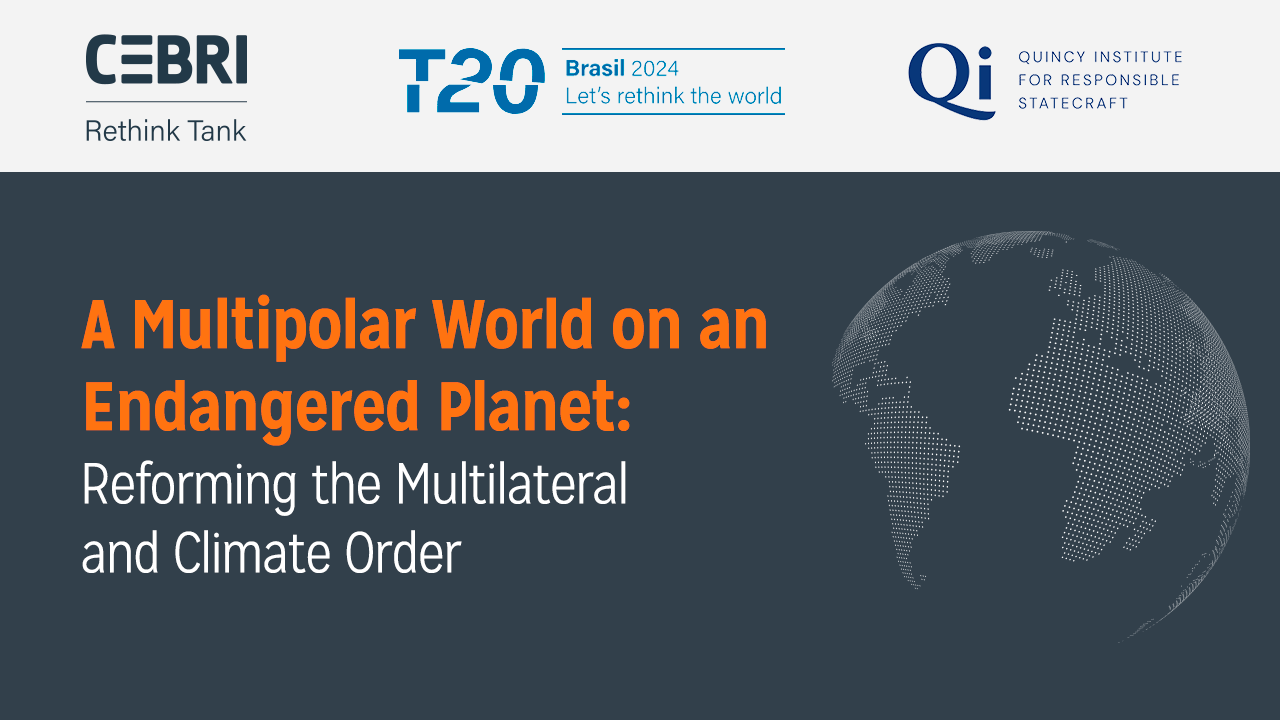Closed-door meetings
A Multipolar World on an Endangered Planet: Reforming the Multilateral and Climate Order
- T20
November 13, 2024
Climate change, inequality, and the rise of China and the Global South are challenging the post-Bretton Woods global order. This context presents both opportunities and risks associated with the need to redesign this outdated system. Rather than a purely multipolar world where powers clash over existing norms, a "multi-order" world may emerge, with states advancing distinct rules and systems. This raises questions about whether new, cooperative orders can manage crises and how opposing powers can find common ground, especially on climate security.
As global temperature rise approaches 1.5 C, the question of climate change’s impacts on security are becoming more prominent. Even though the UN has integrated climate security into its peacekeeping efforts, the issue still divides the international community, including the Global South. The CEBRI-Quincy Institute T20 Brasil side-event will explore these global shifts and proposals from the Better Order Project and beyond, looking to the future of global governance.
Partnership: Quincy Institute
OPENING REMARKS
Julia Dias Leite, CEO at CEBRI
PANEL 1 | THE BETTER ORDER PROJECT’S VISION FOR STABILIZING AN INTERNATIONAL ORDER IN TRANSITION AWAY FROM UNIPOLARITY
Moderation: Feliciano de Sá Guimarães, Academic Director at CEBRI and Associate Professor of International Relations at the University of São Paulo (IRI-USP)
-
Ambassador Antonio de Aguiar Patriota, Member of CEBRI’s International Advisory Board and Brazil’s Ambassador to the United Kingdom
-
Trita Parsi, Executive Vice-President and Co-founder of the Quincy Institute for State for Responsible Statecraft
-
Marianna Albuquerque, Senior Fellow at CEBRI and Professor at the Institute of International Relations and Defense, Federal University of Rio de Janeiro (IRID-UFRJ)
PANEL 2 | BRIDGING THE NORTH-SOUTH GAP IN PREVENTIVE CLIMATE SECURITY
Moderation: Teresa Rossi, Deputy Director of Partnerships and International Cooperation at CEBRI
-
Elizabeth Sidiropoulos, Chief Executive of the South African Institute of International Affairs (SAIIA)
-
Hussein Kalout, International Advisory Board Member at CEBRI and Editor-in-Chief of CEBRI-Journal
-
Sarang Shidore, Director of the Global South program at the Quincy Institute
Climate change, inequality, and the rise of China and the Global South are challenging the post-Bretton Woods global order. This context presents both opportunities and risks associated with the need to redesign this outdated system. Rather than a purely multipolar world where powers clash over existing norms, a "multi-order" world may emerge, with states advancing distinct rules and systems. This raises questions about whether new, cooperative orders can manage crises and how opposing powers can find common ground, especially on climate security.
As global temperature rise approaches 1.5 C, the question of climate change’s impacts on security are becoming more prominent. Even though the UN has integrated climate security into its peacekeeping efforts, the issue still divides the international community, including the Global South. The CEBRI-Quincy Institute T20 Brasil side-event will explore these global shifts and proposals from the Better Order Project and beyond, looking to the future of global governance.
Partnership: Quincy Institute
OPENING REMARKS
Julia Dias Leite, CEO at CEBRI
PANEL 1 | THE BETTER ORDER PROJECT’S VISION FOR STABILIZING AN INTERNATIONAL ORDER IN TRANSITION AWAY FROM UNIPOLARITY
Moderation: Feliciano de Sá Guimarães, Academic Director at CEBRI and Associate Professor of International Relations at the University of São Paulo (IRI-USP)
-
Ambassador Antonio de Aguiar Patriota, Member of CEBRI’s International Advisory Board and Brazil’s Ambassador to the United Kingdom
-
Trita Parsi, Executive Vice-President and Co-founder of the Quincy Institute for State for Responsible Statecraft
-
Marianna Albuquerque, Senior Fellow at CEBRI and Professor at the Institute of International Relations and Defense, Federal University of Rio de Janeiro (IRID-UFRJ)
PANEL 2 | BRIDGING THE NORTH-SOUTH GAP IN PREVENTIVE CLIMATE SECURITY
Moderation: Teresa Rossi, Deputy Director of Partnerships and International Cooperation at CEBRI
-
Elizabeth Sidiropoulos, Chief Executive of the South African Institute of International Affairs (SAIIA)
-
Hussein Kalout, International Advisory Board Member at CEBRI and Editor-in-Chief of CEBRI-Journal
-
Sarang Shidore, Director of the Global South program at the Quincy Institute

